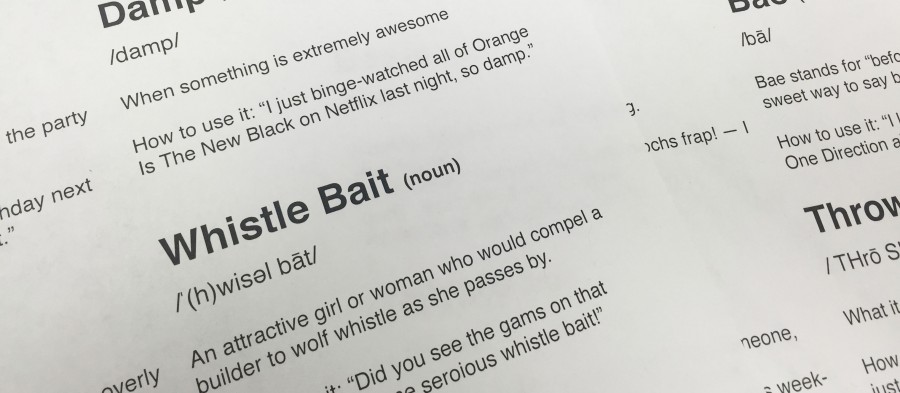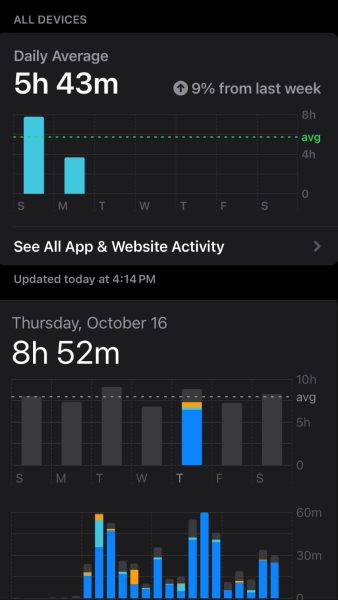Top 10: Old-fashioned slang words to bring back
Some words have been lost to time. Bringing back these nostalgic terms will spice up the modern English language.
September 21, 2015
Vintage styles are back in full force. Everything from classic cars to retro dresses are en vogue. Why not do the same for the English language? This list covers the best of the best of the English language spanning the 1500s to the 1950s.
1. Forty-Niner
/’fôrdē,ˈnīnər/
(male gold-digger)
As the 1940s wore on, women entered the workforce in larger numbers than ever before. With this increase in employment came a surge in financially independent women. This trend has only increased in the decades since. Inspired by the California gold rush, the term “Forty-Niner” has it all when it comes to a slang term that needs to re-enter the English lexicon. It has style, it has wit, and, above all, it is completely culturally relevant to the current state of female independence.
2. Spifflicate
/ˈspif(ə)ləˌkāt/
(drunk)
The English language of the 1920s had a certain poetic flair that has become alarmingly absent in modern speech. It is high time to bring back some of that pizzazz and what better word to start with than spifflicate? This word adds a certain air of sophistication to an otherwise unsophisticated predicament.
3. Gams
/ɡams/
(legs)
The 1920s brought with it a revolution that included higher hemlines than ever before. With this came a newfound appreciation for a nice pair of legs, or, as our great grandparents would have said, gams. Though a nice pair of gams has remained in the forefront of modern fashion, most of the terms used to describe legs have all but disappeared from existence.
4. Cabbage
/ˈkabij/
(money)
There are so many fun terms for money, yet, for some reason, the majority of society has decided to stick with “dough” and “bucks.” It is high time we bring back some vintage variety to cash. Cabbage, lettuce and kale were used in the 1930s to describe the ever-powerful greenback, but why stop with there? Let’s overhaul the way we talk about money. Bread, cheddar, clams, and bones were all at one time used as synonyms for cold hard cash.
5. Bluenose
/ˈblo͞onōz/
(prude)
This 1940s term is straight up poetry! Modern insults are so harsh that their roughness can often overshadow the message being conveyed. The term, “bluenose,” is almost too pretty to be upsetting, though it does send a pretty clear message to those uptight enough to deserve the label.
6. Giggle Water
/ˈɡiɡəl,ˈwädər/
(an alcoholic beverage)
What’s better? Getting drunk off alcoholic beverages or getting spifflicated off giggle water? Those bootlegging guys and gals knew how to have a good time, as evidenced by this creative, yet oh-so-literal term.
7. Swyve
/swīv/
(the f-word)
There are many instances in life that warrant a passionate, simple exclamation of frustration or dissatisfaction. The inappropriateness of the f-word, however, makes it a bad choice for many social circumstances. Enter: swyve. This medieval term is short and sweet. Its exotic nature would make it more acceptable by current standards.
8. Quail hunting
/kwāl,ˈhən(t)iNG/
(picking up girls)
No matter what era you look at, there will always be a term for a group of young men on the prowl. Today’s men go “cruising for chicks,” whereas their grandfathers would instead spend an evening “quail hunting.” The technique and skill implied by this 1950s term adds an air of sophistication to the popular practice, which many modern girls would agree, is largely lacking from today’s dating scene.
9. Adam’s Ale
/ˈadəms, āl/
(water)
Medieval people may not have had all of the fun, convenient ways to dress up their water that we do; but they made up for that with this snappy phrase. Adam’s Ale was a reference to the beverage of choice of Adam and Eve. When it comes to old-timey slang, you can’t beat this Biblical moniker.
10. Yard
/yärd/
(one thousand dollars)
Old-timey units of measurement are so much fun, it’s crazy that they have fallen to the wayside. Why use simple numerical figures when you can dress it up with this perfect vintage term from the 1950s?




